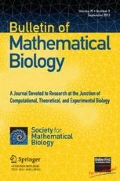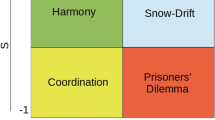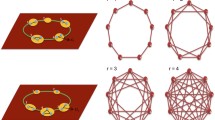Abstract
Evolutionary game theory provides an appropriate tool for investigating the competition and diffusion of behavioral traits in biological or social populations. A core challenge in evolutionary game theory is the strategy selection problem: Given two strategies, which one is favored by the population? Recent studies suggest that the answer depends not only on the payoff functions of strategies but also on the interaction structure of the population. Group interactions are one of the fundamental interactive modes within populations. This work aims to investigate the strategy selection problem in evolutionary game dynamics on group interaction networks. In detail, the strategy selection conditions are obtained for some typical networks with group interactions. Furthermore, the obtained conditions are applied to investigate selection between cooperation and defection in populations. The conditions for evolution of cooperation are derived for both the public goods game and volunteer’s dilemma game. Numerical experiments validate the above analytical results.



Similar content being viewed by others
References
Antal T, Scheuring I (2006) Fixation of strategies for an evolutionary game in finite populations. Bull Math Biol 68:1923–1944
Antal T, Nowak MA, Traulsen A (2009) Strategy abundance in \(2\times 2\) games for arbitrary mutation rates. J Theor Biol 257:340–344
Antal T, Traulsen A, Ohtsuki H, Tarnita CE, Nowak MA (2009) Mutation–selection equilibrium in games with multiple strategies. J Theor Biol 258:614–622
Axelrod R, Hamilton WD (1981) The evolution of cooperation. Science 211:1390–1396
Bentley RA, Hahn MW, Shennan SJ (2004) Random drift and culture change. Proc R Soc B 271(1547):1443–1450
Brandt H, Hauert C, Sigmund K (2003) Punishment and reputation in spatial public goods games. Proc R Soc B 270:1099–1104
Broom M, Rychtář J (2009) An analysis of the fixation probability of a mutant on special class of non-directed graphs. Proc R Soc A 464:2609–2627
Chuang JS, Rivoire O, Leibler S (2009) Simpsons paradox in a synthetic microbial system. Science 323:272–275
Cremer J, Melbinger A, Frey E (2012) Growth dynamics and the evolution of cooperation in microbial populations. Sci Rep 2. doi:10.1038/srep00281
Doebeli M, Knowlto N (1998) The evolution of interspecific mutualisms. Proc Natl Acad Sci USA 95:8676–8680
Ewens WJ (ed) (2004) Mathematical population genetics, 2nd edn. Springer, New York
Fu F, Tarnita CE, Christakis NA, Wang L, Rand DG, Nowak MA (2012) Evolution of in-group favoritism. Sci Rep 2 . doi:10.1038/srep00460
Gokhale CS, Traulsen A (2010) Evolutionary games in the multiverse. Proc Natl Acad Sci USA 107:5500–5504
Griffin AS, West SA, Buckling A (2004) Cooperation and competition in pathogenic bacteria. Nature 430:1024–1027
Herzog HA, Bentley RA, Hahn MW (2004) Random drift and large shifts in popularity of dog breeds. Proc R Soc B 271(Suppl. 5):353–356
Johnson DDP, Stopka P, Knights S (2003) Sociology: the puzzle of human cooperation. Nature 421:911–912
Langer P, Nowak MA, Hauert C (2008) Spatial invasion of cooperation. J Theor Biol 250:634–641
Lawler GF (ed) (2006) Introduction to stochastic processes, 2nd edn. Chapman and Hall, New York
Lieberman E, Hauert C, Nowak MA (2005) Evolutionary dynamics on graphs. Nature 433:312–316
Nowak MA (2006) Evolutionary dynamics: exploring the equation of life. Harvard University Press, Cambridge
Nowak MA (2006) Five rules for the evolution of cooperation. Science 314:1560–1563
Nowak MA, May RM (1992) Evolutionary games and spatial chaos. Nature 359:826–829
Nowak MA, Sigmund K (2005) Evolution of indirect reciprocity. Nature 427:1291–1298
Nowak MA, Tarnita CE, Antal T (2010) Evolutionary dynamics in structured populations. Philos Trans R Soc B 365:19–30
Ohtsuki H (2010) Stochastic evolutionary dynamics of bimatrix games. J Theor Biol 264:136–142
Ohtsuki H, Hauert C, Lieberman E, Nowak MA (2006) A simple rule for the evolution of cooperation on graphs and social networks. Nature 441:502–505
Ohtsuki H, Nowak MA (2006) Evolutionary games on cycles. Proc R Soc B 273:2249–2256
Perc M, Gomez-Gardenes J, Szolnoki A, Floria LM, Moreno Y (2013) Evolutionary dynamics of group interactions on structured populations: a review. J R Soc Interface 10. doi:10.1098/rsif.2012.0997
Rainey PB, Rainey K (2003) Evolution of cooperation and conflict in experimental bacterial populations. Nature 425:72–74
Samuelson L (1997) Evolutionary games and equilibrium selection. MIT Press, Cambridge
Santos FC, Pacheco JM, Lenaerts T (2006) Evolutionary dynamics of social dilemmas in structured heterogeneous populations. Proc Natl Acad Sci USA 103:3490–3494
Santos FC, Santos MD, Pacheco JM (2008) Social diversity promotes the emergence of cooperation in public goods games. Nature 454:213–216
Smith JM (1982) Evolution and the theory of games. Cambridge University Press, Cambridge
Smith JM, Price GR (1973) The logic of animal conflict. Nature 246:15–18
Szabó G, Fath G (2007) Evolutionary games on graphs. Phys Rep 446:97–216
Szolnoki A, Perc M, Szabó G (2009) Topology-independent impact of noise on cooperation in spatial public goods games. Phys Rev E 80. doi:10.1103/PhysRevE.80.056109
Tan S, Lu J (2014) Characterizing the effect of population heterogeneity on evolutionary dynamics on complex networks. Sci Rep 4. doi:10.1038/srep05034
Tan S, Lu J, Yu X, Hill D (2013) Evolution and maintenance of cooperation via inheritance of neighborhood relationship. Chin Sci Bull 58:3491–3498
Tan S, Lu J, Chen G, Hill D (2014a) When structure meets function in evolutionary dynamics on complex networks. IEEE Circ Syst Mag (in press)
Tan S, Lu J, Hill D (2014b) Towards a theoretical framework for analysis and intervention of random drift on general networks. IEEE Trans Autom Contr. doi:10.1109/TAC.2014.2329235
Tang C, Li X, Cao L, Zhan J (2012) The \(\sigma \) lar of evolutionary dynamics in community-structured population. J Theor Biol 306:1–6
Tarnita CE, Antal T, Ohtsuki H, Nowak MA (2009) Evolutionary dynamics in set structured populations. Proc Natl Acad Sci 106:8601–8604
Tarnita CE, Ohtsuki H, Antal T, Fu F, Nowak MA (2009) Strategy selection in structured populations. J Theor Biol 259:570–581
Tarnita CE, Wage N, Nowak MA (2011) Multiple strategies in structured populations. Proc Natl Acad Sci USA 108:2334–2337
Velicer GJ, Yu YN (2003) Evolution of novel cooperative swarming in the bacterium Myxococcus xanthus. Nature 425:75–78
Wu B, Zhou D, Fu F, Luo Q, Wang L (2010) Evolution of cooperation on stochastic dynamical networks. PloS ONE 5. doi:10.1371/journal.pone.0011187
Acknowledgments
This work was supported by the Fundamental Research Funds for the Central Universities, the National Natural Science Foundation of China under Grants 61304151 and Grants 61304157, and the Science Foundation of Henan University under Grants 2012YBZR007.
Author information
Authors and Affiliations
Corresponding author
Rights and permissions
About this article
Cite this article
Tan, S., Feng, S., Wang, P. et al. Strategy Selection in Evolutionary Game Dynamics on Group Interaction Networks. Bull Math Biol 76, 2785–2805 (2014). https://doi.org/10.1007/s11538-014-0031-y
Received:
Accepted:
Published:
Issue Date:
DOI: https://doi.org/10.1007/s11538-014-0031-y




